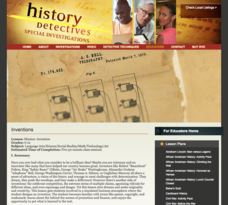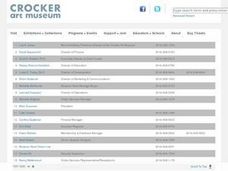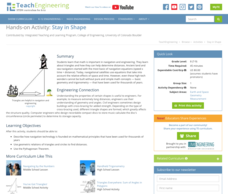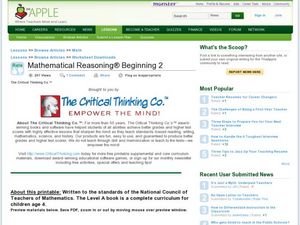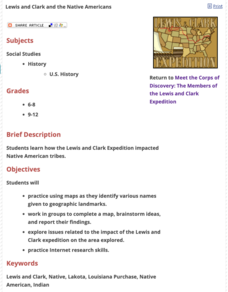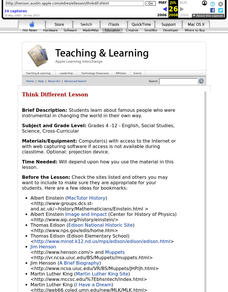PBS
Taking A Field Trip
Field trips require a great deal of advanced planning to be successful. Ensure the success of your trips with a step-by-step preparation guide that itemizes before, during, and after activities as well as extension and adaptation...
Curated OER
Johannes Gutenberg and the Printing Press
Young scholars use library or online resources to create time lines on the life of Johannes Gutenberg and tell the impact his invention, the printing press, had on the development of newspapers.
Curated OER
Stonewall and Beyond: Gay and Lesbian Issues
Help learners understand their own biases and how their perspectives may have been influenced by biased media sources. They keep a journal while viewing videos, exploring websites, and engaging in class discussions related to gay and...
Curated OER
Put a Woman on a Stamp
Students nominate a woman to appear on a postage stamp. They explore the contributions of American women. Explain to students that the U.S. Postal Service issues 25 to 40 new commemorative stamps each year.
Curated OER
Perceptions of War
Tenth graders share perspectives on war with Iraq with students from various countries, and write position papers expressing specific stance on issues.
PBS
Inventions
Use this lesson plan to discuss inventions that have changed your class's world and have impacted society. Middle schoolers investigate important inventions of their time and design an invention in a simulated business atmosphere. Modify...
Curated OER
Book: What the Land Means to Americans
Students, after reading Chapter One in the book, "What the Land Means to Americans," research from a variety of resources Tlingit totem poles. After their extensive research, they create a totem pole to present to their peers to...
Curated OER
Inventions- The Impact
Learners investigate inventions and the impact they can have on people. In this technology lesson, students research Thomas Edison and discuss how the invention of the light bulb impacted others. Learners sketch out an invention they...
Curated OER
When Art Conveys a Political Message
Twelfth graders learn art is an effective way to convey a political message. They learn how political messages are created to convey a message. They analyze a piece of artwork and then write a short paragraph from the point of view of...
Curated OER
When Art Conveys Political and Social Conflict
Twelfth graders consider art as a medium to convey information and opinions on social conflict and issues. They analyze images from the Crocker Art Museum, discuss their effectiveness in raising awareness of an issue, and create a...
Teach Engineering
Will It Fly?
Go fly a kite, then fly a plane! The 19th part of a 22-part unit on aviation looks at the way kites and gliders help aid in the understanding of flight. Pupils discuss how engineers used kites to influence airplane designs.
Teach Engineering
Stay in Shape
Using their knowledge of right triangles, pupils find out how far a ship is from a light house. Class members determine how far around the world a ship would be sailing at a constant speed.
Curated OER
Critical Thinking Problems
Young mathematicians practice their reasoning as well as adding and subtracting skills with this worksheet that includes five simple word problems about birthdays. Learners are give pictures of birthday cakes and based on the number of...
National Park Service
Same Colors, Different Flavors
Who says getting to know your neighbors has to be difficult? The first resource in a three-part series creates an engaging project that teaches your scholars about Canadian culture. A question-and-answer format takes place via e-mail and...
American Museum of Natural History
Create Your Own Time Capsule
The corona virus pandemic is indeed a historic event. A time capsule activity permits young historians to document these days of social distancing, remote learning, and quarantine by collecting artifacts that capture what their lives are...
Curated OER
World Religion At A Glance
Ninth graders research and assigned religion and fill out information they gather on their "Special Assingment Instruction Sheet." They create a sample brochure about the religion they researched, edit the brochure with another student...
Curated OER
Signs of Our Times
Students view photographs of the signs and symbols in their local community. As a class, they note the reason for the signs and write the words on the board. Individually, they complete a worksheet in which they match the symbols with...
Curated OER
Go For The Gold!
Third graders read fiction and nonfiction works for comprehension. Using the internet, 3rd graders participate in a WebQuest. They compare and contrast the Olympics in ancient Greece to the modern day Olympics. Afterwards, students...
Curated OER
You Too Can Haiku
Students explore the country of Japan. For this international studies lesson, students utilize their geography skills to locate Japan on a map. Students explore some Japanese customs and communities. Students use descriptive...
Curated OER
Student Exploration: Fraction, Decimal, Percent
Students explore the concept of fractions, decimals, and percents. In this number sense lesson, students use a worksheet to guide them through the exploration of the relationship between fractions, decimals, and percents. ...
Curated OER
Lewis and Clark and the Native Americans
Students practice using maps and identifying landmarks on the Lewis and Clark expedition. They research Lewis and Clark's relationship with the Native Americans and report their findings to the class. They identify the impact of the...
Curated OER
A Flag Divided
Students explore the flags of the Union and Confederacy, explore the symbolism of those flags, and create flags of their own.
Curated OER
Earn a Quarter of a Million Dollars in Sports and Never Play a Game!
Students research and list various sports related careers. Students select a career and prepare a five- slide presentation highlighting that career.
Curated OER
People Who "Think Different"
Students conduct Internet research on one famous person to explore his/her important contributions to society.





